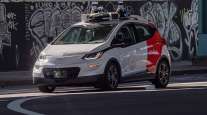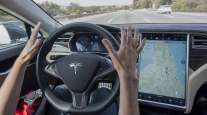Driverless Tech Part of SoftBank’s 300-Year Plan

SoftBank Group Corp.’s Masayoshi Son wants his company to grow for 300 years, and he’s willing to pour billions of dollars into far-out technology to make it happen.
General Motors Co., a business that is already more than a century old, is now part of that plan.
GM said May 31 that the SoftBank Vision Fund is investing $2.25 billion in its Cruise autonomous-car unit. The deal adds to a collection of long-term bets Son is making through the nearly $100 billion fund, many of them in the area of automation and artificial intelligence.
He sees AI software making computers smarter than humans, while millions of formerly dumb objects will be linked to the internet. Toward that end, he has acquired chip designer ARM Holdings and backed Nvidia Corp. Half a billion dollars went to startup Improbable, which is developing detailed virtual worlds.
Ride-hailing moves include stakes in Uber Technologies Inc. and China’s Didi. In robotics, Son is buying Boston Dynamics and invested in software maker Brain Corp. WeWork and Slack are bets that technology will change how humans work. There are biotech, e-commerce and digital payments deals, too.
“Son is trying to create an unprecedented conglomerate by investing in companies that have a chance to be No. 1 in businesses such as AI and IoT,” said Tomoaki Kawasaki, an analyst at Iwai Cosmo Securities Co. “If he’s able to find other companies that are strong in autonomous driving, it’s possible we’ll see a second or third round of investments too.”
RELATED: Fear of autonomous vehicles rises after high-profile roadway deaths
GM shares surged 13%, the most since its November 2010 initial public offering. SoftBank shares were little changed in Tokyo.
The GM investment highlights a growing rivalry between Son and another leading futurist: Google co-founder Larry Page. Both are obsessed with using cutting-edge technology to transform their companies from mere corporations into perpetual innovation factories that can outlast their human creators for centuries.
SoftBank’s aim is to “grow as a corporate group for the next 300 years.” Page has created a startup called Calico to extend human life, and formed the Alphabet Inc. holding company to foster future businesses beyond Google’s internet operations.
Page’s pursuit of revolutionary transportation solutions set off the modern era of autonomous cars during the 2008 financial crisis that put several automakers on the path to bankruptcy. Son’s interest is more recent, but his pockets may be deeper: he’s already working on a second Vision Fund. The GM transaction puts new pressure on Page’s goal to be first to overhaul transportation.
RELATED: Self-driving cars find clearer paths to market outside US
Until May 31, driverless technology represented a minuscule piece of Son’s futuristic portfolio. Tokyo-based SoftBank helped finance Nauto, a startup that makes technology to help develop autonomous cars, and Mapbox, which is building detailed digital maps. But these were relatively small transactions by SoftBank’s recent standards.
The field is still unproven commercially, but the technology has shown enough potential that the auto industry is rushing to develop or buy its own capabilities, and some analysts have already placed hefty valuations of $70 billion or more on Alphabet’s Waymo, considered a leader. That’s catnip for Son, who likes to take giant stakes in game-changing technology.
SoftBank’s bets on ride-hailing via Uber and Didi may struggle long-term if the companies don’t embrace autonomous driving to cut the cost of providing their services. Waymo is already running a test service in Phoenix and plans to start charging for it soon.
Uber has a self-driving vehicle unit, but one of its cars killed a pedestrian in Arizona earlier this year, bringing testing in that state to a halt and putting a major question mark on the future of the company’s initiative. Backing GM’s effort diversifies Son’s autonomous-driving investments and makes the largest U.S. automaker a major contender in the field.
RELATED: Self-driving car pioneers are slowing down after crashes
The future of Uber’s autonomous-vehicle group already had been in doubt for about a year as the larger company confronted a series of scandals, including a now-settled trade-secrets lawsuit filed by Alphabet’s Waymo over driverless technology.
Son has pushed for some of the companies he backs to work together and even merge, although the ride-hailing startups SoftBank has invested in are mostly still competing.
Uber CEO Dara Khosrowshahi is sticking with the driverless-car project for now. “We’ve got to get back on the road, but we have to be satisfied that we can do that in the safest way possible,” he said during the Code conference this week. “We will get back on the road over the summer.”
Still, Khosrowshahi said Uber will “look to partner” on self-driving projects, and “as a principal we will license out our own technology.” He’s talking with Waymo about adding its autonomous vehicles into Uber’s ride-hailing network.
If Khosrowshahi changes his mind about keeping the initiative independent, Son and Page are likely to be waiting with their checkbooks.
With assistance from Yuki Furukawa and Yuji Nakamura.




